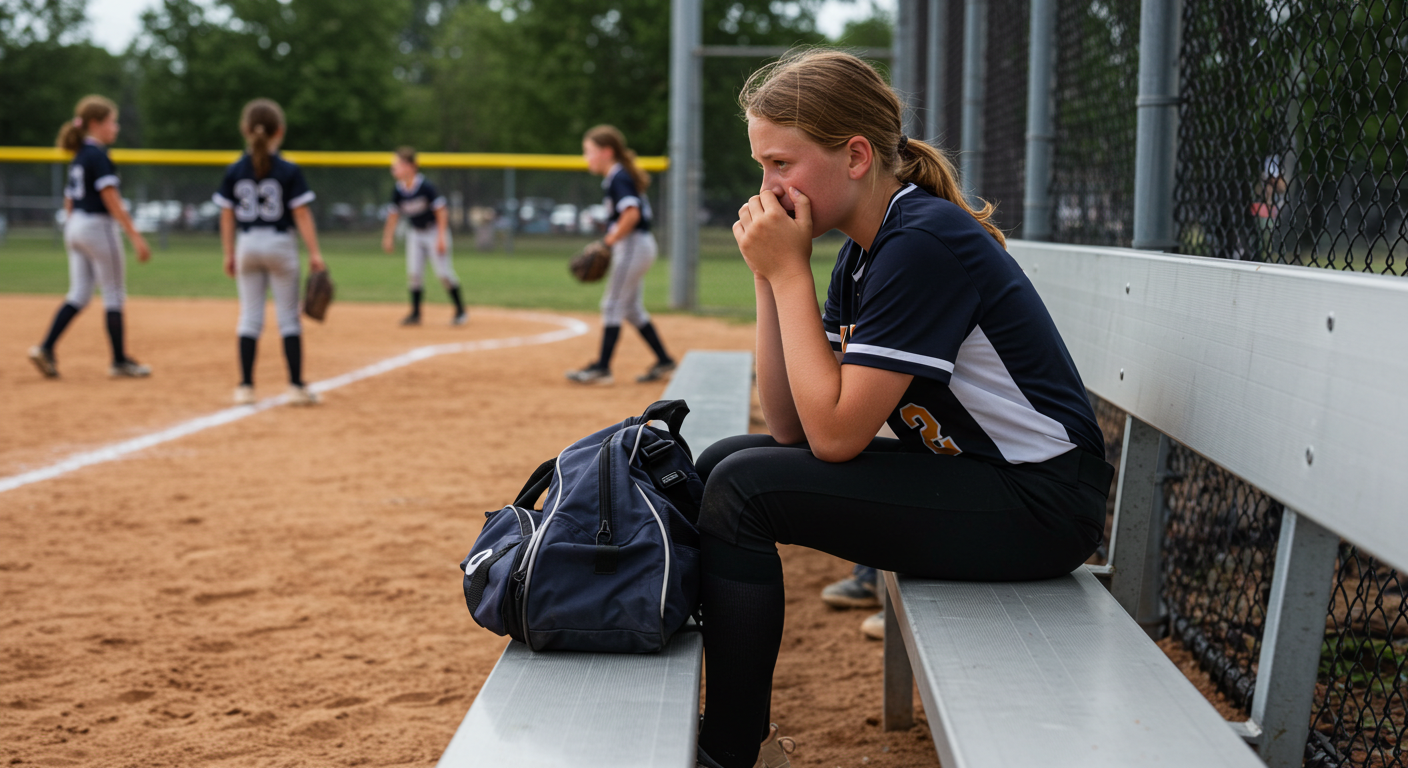Welcome to the Brain & Faith Blog
This is where science and Scripture meet to help you find clarity, calm, and confidence, one practical step at a time. Whether you're feeling mentally overloaded, spiritually disconnected, or just craving a bit more peace in your day, you'll find simple, brain-based strategies and faith-filled insights to guide the way. Everything here is designed to help you renew your mind, restore your energy, and reconnect with the life God designed you to live.

Performance Anxiety in Young Athletes: Signs, Causes, and Solutions
When Sports Stop Being Fun
Your once-enthusiastic 11-year-old now complains of stomachaches before every game. Your teenager, who used to love basketball, suddenly seems terrified of taking shots. Your child who begged to play soccer is now finding excuses to miss practice.
If this sounds familiar, you're not alone. Performance anxiety in young athletes has reached epidemic proportions, affecting an estimated 25-40% of youth sports participants. What was once considered normal pre-game nerves has evolved into something much more serious, impacting not just athletic performance but overall mental health and well-being.
The rise in performance anxiety among young athletes isn't coincidental. It's the predictable result of increased pressure, earlier specialization, social media comparison, and a culture that equates athletic success with personal worth. Understanding this growing crisis is the first step toward helping your child rediscover the joy in their sport.
Recognizing the Signs: What Performance Anxiety Looks Like
Performance anxiety in young athletes manifests differently than adult anxiety, and it's not always obvious. Many parents mistake these signs for typical pre-game nerves or assume their child is just being dramatic. Learning to recognize the real symptoms can help you intervene before anxiety takes over your child's athletic experience.
Physical Symptoms That Signal Trouble
The body often speaks before the mind does when it comes to anxiety. Watch for recurring physical complaints that seem to appear before practices or games. Frequent stomachaches, headaches, or nausea that mysteriously disappear after sports activities may indicate anxiety rather than illness.
Sleep disturbances are another red flag. If your child has trouble falling asleep before games, experiences nightmares about sports scenarios, or seems exhausted despite adequate rest, anxiety might be the culprit. Changes in appetite, particularly loss of appetite before competitions, can also signal performance anxiety.
Some children develop physical tension that they can't release. You might notice them constantly fidgeting, unable to sit still, or complaining of muscle tightness that doesn't seem related to physical exertion. Rapid heartbeat, sweating, or difficulty breathing before sports activities are more obvious signs that shouldn't be ignored.
Emotional and Behavioral Changes
Performance anxiety often shows up as dramatic shifts in your child's emotional relationship with their sport. A child who once couldn't wait for practice might suddenly become reluctant or resistant. They may express fears about disappointing you, their coach, or their teammates that seem disproportionate to the situation.
Watch for perfectionist tendencies that go beyond healthy goal-setting. If your child becomes devastated by minor mistakes, refuses to try new skills for fear of failure, or seems to catastrophize normal setbacks, anxiety may be taking hold. Some children become overly critical of their own performance, focusing exclusively on what went wrong rather than celebrating what went right.
Mood changes around sports activities are particularly telling. If your typically happy child becomes irritable, withdrawn, or emotional specifically in relation to their sport, take notice. Some children develop avoidance behaviors, finding creative excuses to miss practices or games, or suddenly losing interest in a sport they previously loved.
Cognitive Signs Parents Often Miss
Performance anxiety significantly impacts how young athletes think about their sport and themselves. Listen for negative self-talk that goes beyond normal frustration. Phrases like "I'm terrible at this," "Everyone is better than me," or "I'm going to embarrass myself" indicate anxious thinking patterns.
Some children become obsessed with outcomes rather than process, constantly worrying about winning, losing, or how they'll perform. They might ask repetitive questions about upcoming games or seek constant reassurance about their abilities. Others develop all-or-nothing thinking, believing that anything less than perfect performance is failure.
Concentration problems during practice or games can also indicate anxiety. If your child seems distracted, forgetful of instructions they normally remember, or unable to focus during activities they once enjoyed, anxiety might be interfering with their cognitive function.
Understanding the Root Causes
Performance anxiety in young athletes rarely develops in isolation. It's typically the result of multiple factors combining to create an environment where sports become a source of stress rather than joy. Understanding these causes helps parents address the underlying issues rather than just treating symptoms.
The Pressure Cooker Environment
Modern youth sports culture has created unprecedented pressure on young athletes. The emphasis on winning, rankings, and college scholarships has trickled down to elementary-age children who should be focused on fun and skill development. When children internalize the message that their worth depends on their athletic performance, anxiety becomes inevitable.
Social media amplifies this pressure by creating constant comparison opportunities. Young athletes see highlight reels of their peers and professional athletes, leading to unrealistic expectations about their own performance. The fear of public failure, whether real or perceived, can paralyze young athletes who once played freely.
Parent and coach expectations, even when well-intentioned, can contribute to performance anxiety. Children are remarkably perceptive and often sense adult anxiety about their performance, even when it's not explicitly expressed. The pressure to earn playing time, make select teams, or secure scholarships creates a high-stakes environment that many young minds aren't equipped to handle.
Developmental Factors
The timing of performance anxiety often coincides with normal developmental changes that make children more vulnerable to stress. During middle school years, children become increasingly aware of peer judgment and social comparison. Their developing brains are still learning to regulate emotions, making them more susceptible to anxiety in high-pressure situations.
Perfectionist tendencies, which often emerge during the elementary years, can transform from helpful motivation into debilitating anxiety. Children who naturally set high standards for themselves may struggle when those standards become impossible to meet consistently.
The transition from recreational to competitive sports often triggers anxiety in children who aren't developmentally ready for increased pressure. What once felt like play suddenly becomes serious business, and some children struggle to adapt to this shift.
Family and Environmental Influences
Family dynamics significantly impact how children experience sports pressure. Parents who are highly invested in their child's athletic success, even with the best intentions, may inadvertently create anxiety. Children pick up on parental stress, disappointment, or over-excitement about their performance.
The competitive culture within teams and clubs can also foster anxiety. When coaches emphasize winning over development, create fear-based motivation, or fail to address team dynamics that promote unhealthy competition, young athletes may develop anxiety as a coping mechanism.
Previous negative experiences in sports can create lasting anxiety patterns. A child who was criticized harshly by a coach, experienced a significant injury, or faced public embarrassment may develop anxiety as a protective response to prevent future negative experiences.
Practical Solutions That Actually Work
Addressing performance anxiety in young athletes requires a multi-faceted approach that addresses both the symptoms and underlying causes. The goal isn't to eliminate all nervousness, which is normal and can even enhance performance, but to help children develop healthy coping strategies and maintain their love for their sport.
Reframing the Sports Experience
The most powerful intervention parents can make is changing how they talk about and approach their child's sports participation. Shift the focus from outcomes to process, celebrating effort, improvement, and character development rather than just wins and perfect performances.
Help your child develop a growth mindset by emphasizing that mistakes are learning opportunities rather than failures. When they make errors, ask "What did you learn from that?" instead of offering immediate corrections or reassurance. This approach helps children see challenges as normal parts of development rather than threats to their self-worth.
Create family conversations about sports that focus on enjoyment and personal growth. Ask questions like "What was the most fun part of practice today?" or "What's something new you tried?" rather than "How did you play?" or "Did you win?" This subtle shift in focus can significantly reduce performance pressure.
Building Emotional Regulation Skills
Teaching young athletes practical anxiety management techniques gives them tools they can use independently. Deep breathing exercises are particularly effective because they're simple, portable, and provide immediate relief. Teach your child the 4-7-8 breathing technique: inhale for 4 counts, hold for 7, exhale for 8.
Progressive muscle relaxation helps children recognize and release physical tension. Guide them through tensing and relaxing different muscle groups, starting with their toes and working up to their head. This technique is especially helpful for children who carry anxiety in their bodies.
Visualization and mental rehearsal can transform anxiety-provoking situations into familiar, manageable experiences. Help your child practice mentally rehearsing successful performances, focusing on the process rather than outcomes. This mental practice builds confidence and reduces fear of the unknown.
Creating a Supportive Environment
Your response to your child's anxiety significantly impacts their recovery. Validate their feelings without dismissing them or trying to fix everything immediately. Phrases like "I understand you're feeling nervous, and that's okay" help children feel heard and supported.
Establish pre-game routines that focus on preparation rather than pressure. This might include listening to favorite music, doing specific warm-up exercises, or engaging in calming activities that help your child feel ready and confident.
Work with coaches to ensure they understand your child's anxiety and are willing to provide appropriate support. Good coaches can modify their approach to help anxious athletes while still maintaining team standards and expectations.
When to Seek Professional Help
While many cases of performance anxiety can be addressed through parental support and environmental changes, some situations require professional intervention. Consider seeking help from a sports psychologist or mental health professional if your child's anxiety is severe, persistent, or interfering with other areas of their life.
Red flags that indicate professional help may be needed include panic attacks before or during sports activities, complete avoidance of their sport despite previous enjoyment, anxiety that extends beyond sports into school or social situations, or physical symptoms that persist despite medical clearance.
A qualified sports psychologist can provide specialized techniques like cognitive-behavioral therapy adapted for young athletes, help identify specific triggers, and work with your family to develop comprehensive coping strategies.
The Long-Term Perspective
Addressing performance anxiety in young athletes isn't just about improving their sports experience, though that's certainly important. It's about teaching life skills that will serve them well beyond athletics. Children who learn to manage anxiety, cope with pressure, and maintain perspective in challenging situations develop resilience that benefits them academically, socially, and professionally.
The goal is raising young people who can pursue their passions with confidence, handle setbacks with grace, and maintain their mental health in high-pressure situations. Sports provide an excellent laboratory for developing these skills, but only when the environment supports growth rather than creating additional stress.
Remember that overcoming performance anxiety is a process, not a quick fix. Be patient with your child and with yourself as you navigate this challenge together. Small improvements in confidence and enjoyment are worth celebrating, even if they don't immediately translate to better performance.
Your Action Plan
Start by having an honest conversation with your child about their sports experience. Ask open-ended questions about how they're feeling and what aspects of their sport they enjoy most and least. Listen without judgment and avoid the urge to immediately solve their problems.
Evaluate your own behavior and communication around your child's sports. Are you inadvertently adding pressure through your reactions, expectations, or conversations? Make necessary adjustments to create a more supportive environment.
Implement one or two anxiety management techniques consistently rather than trying everything at once. Choose strategies that resonate with your child and practice them regularly, not just during stressful situations.
Most importantly, remember that your child's mental health and well-being are more important than their athletic achievement. A child who learns to manage anxiety and maintain their love for physical activity will benefit far more in the long run than one who achieves short-term success at the cost of their mental health.
Performance anxiety in young athletes is treatable and preventable. With the right support, understanding, and interventions, your child can rediscover the joy in their sport while developing valuable life skills that will serve them well beyond their athletic career.
Is your young athlete struggling with performance anxiety? You're not alone, and there is hope. While performance anxiety has become increasingly common in youth sports, it's also highly treatable with the right approach and support. Every child's experience with anxiety is unique, and finding the right combination of strategies often requires personalized guidance. If you'd like help developing a customized plan to support your anxious young athlete, I'd love to work with you. In a free 30-minute consultation, we'll discuss your child's specific challenges, explore evidence-based solutions, and create a roadmap for helping them rediscover confidence and joy in their sport. Because every child deserves to experience the pure joy of athletic participation without the burden of overwhelming anxiety.
Brain Health Matters, LLC
Helping busy minds find peace through faith and neuroscience.
© 2025 Brain Health Matters, LLC. All rights reserved.
Terms & Conditions

